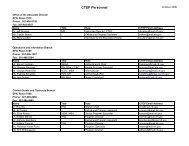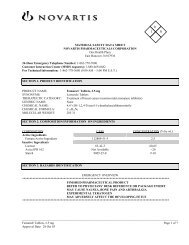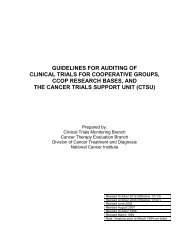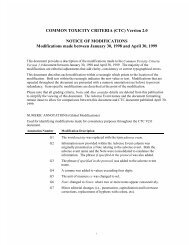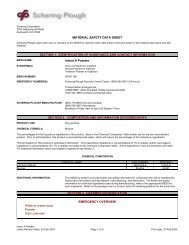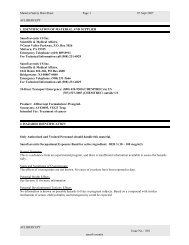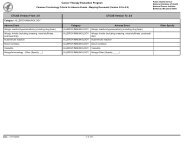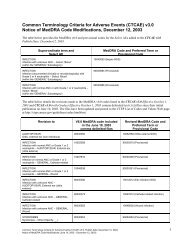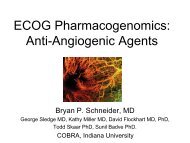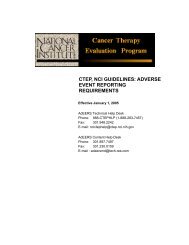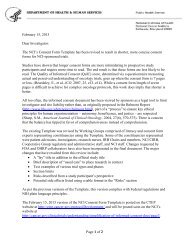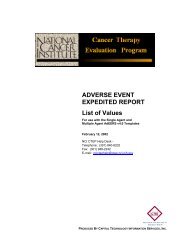NCI National Clinical Trials Network (NCTN) Program Guidelines
NCI National Clinical Trials Network (NCTN) Program Guidelines
NCI National Clinical Trials Network (NCTN) Program Guidelines
You also want an ePaper? Increase the reach of your titles
YUMPU automatically turns print PDFs into web optimized ePapers that Google loves.
PART 1: Overview of <strong>NCTN</strong> <strong>Program</strong> Section IV – Terms/Conditions of Award – <strong>Network</strong> Group Ops Centers<br />
B. Specific Terms and Conditions of Award for the Key Components of the <strong>NCTN</strong> <strong>Program</strong><br />
1. Specific Awardee Rights & Responsibilities - <strong>Network</strong> Group Operations Centers<br />
Throughout these Terms and Conditions of Award, “<strong>Network</strong> Group Operations Center” refers to the<br />
organizational structure which is composed of the key personnel (including the scientific and administrative<br />
leaders of the Center and its scientific research and administrative committees) and the member<br />
institutions/sites (including the institution/site physicians and clinical research associates), responsible for<br />
implementing clinical trials and collaborating on research goals of the <strong>NCTN</strong> <strong>Program</strong> through the <strong>Network</strong><br />
Group Operations Center. In addition, throughout these Terms and Conditions of Award, “<strong>Network</strong> Group<br />
Operations Center,” refers to all of its member institutions/sites no matter how the membership is defined<br />
by a particular <strong>Network</strong> Group Operations Center.<br />
1.1 <strong>Clinical</strong> Trial Development <strong>Program</strong><br />
1.1.1 Overall Research Strategy<br />
It is the responsibility of the <strong>Network</strong> Group Operations Center to develop and articulate an<br />
overall research strategy for the <strong>Network</strong> Group which reflects an integrated scientific approach<br />
both within and across specified disease areas, addresses important unmet clinical needs and<br />
national research goals, includes disease areas appropriate and beneficial to the <strong>NCTN</strong>, and<br />
within the confines of ethical constraints applicable to early and late phase clinical trials for<br />
oncology patients, includes novel or improved ways and/or methods to enhance the <strong>Network</strong><br />
Group’s research strategy and the goals of the entire <strong>NCTN</strong>.<br />
1.1.2 Scientific Research and Administrative Committees<br />
The <strong>Network</strong> Group Operations Center is responsible for establishing scientific research<br />
committees and administrative committees and developing a process for the selection of<br />
leadership for these committees. The <strong>Network</strong> Group Operations Center should ensure that<br />
committees include appropriate representation from the various stakeholders involved in cancer<br />
clinical trial research including a range of scientific and clinical experts and patient advocates.<br />
The <strong>Network</strong> Group Operations Center is responsible for establishing clear operating principles<br />
and procedures for committees and facilitating their operations by arranging meetings and<br />
establishing and maintaining electronic communication tools.<br />
Scientific research committees are defined as committees that function primarily to develop and<br />
oversee the conduct of clinical trials and studies within a defined research strategy (e.g., disease<br />
committee such as a breast committee that conducts trials in breast cancer, other scientific<br />
committees such as an experimental therapeutics committee or a correlative science<br />
committee). Administrative Committees are defined as committees that provide essential core<br />
service functions to help effect other aspects of the <strong>Network</strong> Group’s research strategy (e.g.,<br />
Patient Advocacy, <strong>Clinical</strong> Research Associates, Auditing, Pathology, Surgery).<br />
Correlative science studies, especially integral and integrated studies, are increasingly central to<br />
the interpretation of clinical trials data, particularly for studies of molecularly targeted agents.<br />
Scientific research committees play a key role in the development and conduct of correlative<br />
science studies associated with <strong>Network</strong> Group protocols. Funding for integrated and integral<br />
correlative science studies is not provided by the <strong>NCTN</strong> award (except in exceptional<br />
circumstances via an administrative supplement by <strong>NCI</strong>/DCTD for a specific trial) but may be<br />
applied for via BIQSFP funding for phase 3 and randomized phase 2 trials. Other sources of<br />
funding may be sought for correlative science studies that are not eligible for BIQSFP funding<br />
(e.g., other <strong>NCI</strong> and NIH grant funding, industry funding).<br />
Organizational Structure: The <strong>Network</strong> Group Operations Center is responsible for the<br />
Constitution and By-laws for the <strong>Network</strong> Group. The Constitution and By-laws should define<br />
Page 36 of 241



